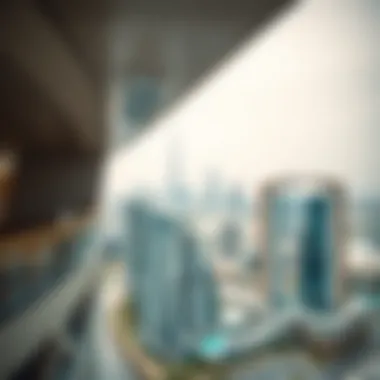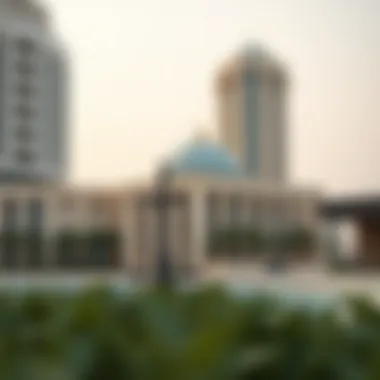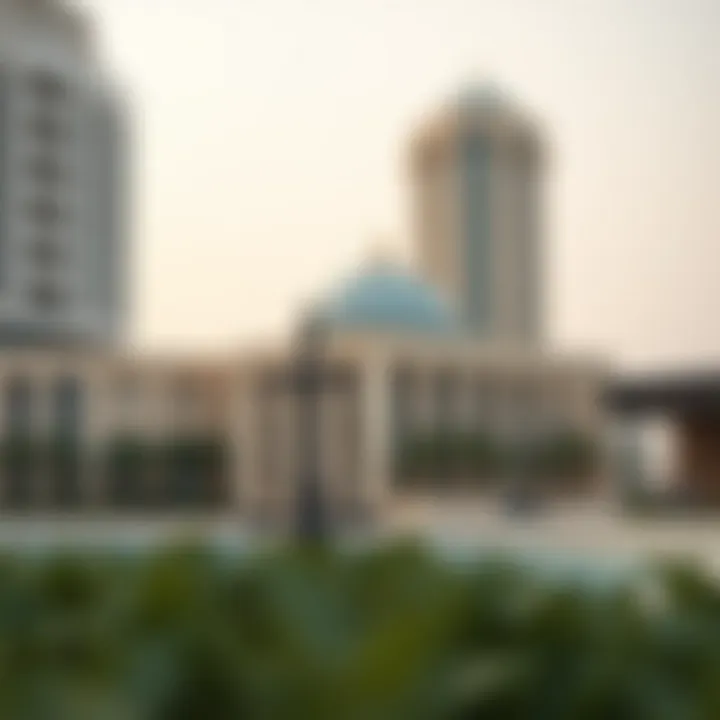Evaluating Safety in the UAE: A Detailed Review


Intro
The United Arab Emirates (UAE) has garnered a reputation on the global stage, not just for its opulence but for its relatively high safety standards. For anyone considering a move to this bustling region or looking to invest in its real estate, understanding the safety landscape is paramount. This exploration aims to dissect various dimensions influencing safety—from crime statistics to the nuances of the law.
While the UAE is often seen as a hub of commerce and innovation, it is crucial to grasp the underlying factors that contribute to its appeal. Prospective residents, investors, and even those contemplating a short visit need a clear picture of what to expect. After all, safety impacts quality of life and investment decisions, making this analysis significant.
As we delve deeper into the complexities of safety in the UAE, we will cover a multitude of topics, each bringing clarity to this multifaceted issue. We’ll break down current market trends, analyze the types of properties that yield high returns, and examine the socio-political aspects that underpin the real estate market and safety itself.
The insights provided aren't merely statistics; they form a narrative about life in the UAE, underscoring the delicate balance between a thriving economy and the necessity of security. What does it mean for families looking for homes? What opportunities lie in wait for astute investors? Let’s embark on this journey to uncover whether the UAE indeed lives up to its reputation as a safe haven.
Understanding Safety in the UAE
When we talk about safety in the United Arab Emirates, we’re not just throwing around a buzzword—this topic resonates deeply for both residents and potential investors. Safety envelops various realms, from personal security to the assurance of stable social order. It acts as the bedrock upon which the real estate landscape rests. Individuals and families looking to reside in or invest in the UAE need to understand what safety means in this context, how it has evolved, and what implications it holds for them.
The UAE’s rapid growth over recent decades transforms it from a tranquil desert to a bustling metropolis laden with opportunities. But with opportunity often comes scrutiny, especially of safety measures in a multicultural society. Hence, comprehending safety in the UAE serves numerous effects:
- Confidence Building: Real estate agents, buyers, and investors can establish trust and clarity when they understand the intricate safety mechanisms present.
- Informed Decision-Making: Delving into safety allows stakeholders to make educated choices about property investments or living arrangements. The data can illuminate which neighborhoods align with their comfort and security expectations.
- Social Integration: A solid grasp of safety and cultural factors enriches the communal experience, fostering smoother integration of expatriates into the local fabric.
This exploration will unfold various narratives and metrics that encapsulate the UAE’s safety, addressing both historical aspects and modern realities.
Defining Safety in a Modern Context
Safety must morph with the times, especially within a rapidly changing society like the UAE’s. At its core, safety encapsulates various elements: liberty from crime, assurance in emergency services, and protection under law. In contemporary terms, the definition has broadened to include not just physical safety but psychological and emotional well-being too. An individual should feel secure in their surroundings, whether that’s in living spaces, public areas, or workplaces.
Key elements that define safety today include:
- Crime Prevention: Proactive rather than reactive approaches, employing technology and community engagement.
- Health Safety: The unforeseen recent pandemic has emphasized the importance of health protocols that also factor into people’s feelings of safety.
- Digital Security: With the UAE’s tech-forward stance, safeguarding personal data becomes intertwined with overall safety.
To put it plainly, safety has taken a holistic approach; it cannot be confined to mere statistics about crime rates—contemporary safety is about the peace of mind that blankets the city.
Historical Overview of UAE's Safety Measures
Reflecting on the safety measures in the UAE is akin to taking a walk through the annals of progress. From its modest beginnings as a collection of tribal territories, the transformation into a unified state has seen a concurrent evolution in their safety protocols. Historically, the UAE has placed emphasis on stability, understanding that safety begets prosperity.
- Foundational Structures: The advent of the UAE itself in 1971 set the stage for a centralized law enforcement framework. Each emirate developed its police forces, collaborating under a federal system that ensures standards are maintained.
- Statutes and Regulations: Over the decades, various laws have been instituted to enhance public safety, from stringent traffic regulations to expansive anti-drug laws. These regulations highlight a commitment to curbing crime and ensuring community safety.
- Recent Developments: Technologies such as surveillance systems and emergency response applications reflect a modern approach that blends traditional values with innovative solutions.
In summary, reflecting on the UAE’s journey highlights not just its achievements, but the benchmarks that come with them—each law and measure is a stone laid in the foundation of a resilient state.
Crime Rates in the UAE
Understanding crime rates in the UAE is vital for anyone considering making this region their home or investing in property here. Low crime levels contribute significantly to the country's attractiveness for expatriates and investors alike. When evaluating the safety of a locale, crime rates offer critical data points that help make informed decisions. An area perceived as safe enhances property values, nurtures community trust, and fosters economic stability. As we delve deeper into this section, it's crucial to unpack the intricate layers that contribute to crime statistics in the UAE.
Statistical Insights into Crime Trends
The UAE is often lauded for its impressive safety record compared to many global counterparts. Official statistics reveal a consistently low crime rate. For instance, in Dubai, the reported crime rate in 2020 was just 60 crimes per 100,000 residents. This percentages are quite staggering when compared to cities in countries like the United States or Brazil, where the numbers can reach into the thousands.
- Types of CrimeThe general categories of crime have also been instrumental in shaping perceptions about safety:
- Violent Crimes: Rarely reported, violent crimes in the UAE are notably low, with factors like strict laws and cultural norms discouraging such behavior.
- Theft and Burglary: Instances are few and far between. Most reported cases involve minor thefts in public places.
- Cyber Crimes: With a burgeoning digital landscape, cyber crimes are on the rise, but the government actively promotes awareness campaigns to tackle these issues.
"The UAE continues to prioritize public safety, and in terms of violent crime, it remains one of the safest places in the world," declared a local law enforcement official during a recent community safety forum.
Comparison with Global Crime Rates
When looking at global crime statistics, the UAE holds a commendable position. Many surveys and studies consistently place the UAE among safer countries. For instance, the Global Peace Index ranks it very high, taking into account various parameters, including crime rates, political stability, and social norms.
- Global Safety Rankings:
- Many Western cities report higher crime statistics in categories like robbery and assault.
- In contrast, according to recent statistics from UNODC, the UAE's indicators suggest a proactive approach to law enforcement and community safety.
Here’s an illustrative overview comparing the UAE's crime rates with a few notable global cities:
| City | Violent Crime Rate (per 100k) | Property Crime Rate (per 100k) | | Abu Dhabi | 1.5 | 20 | | New York | 150 | 370 | | London | 126 | 130 |
Potential residents and investors should make it a point to stay informed about updates in safety protocols and community advice, ensuring they remain aware and proactive.
The Role of Law Enforcement
Understanding the role of law enforcement in the UAE is paramount when assessing the overall safety of the nation. Law enforcement agencies not only uphold the law but also work to ensure that residents and visitors feel secure. Given the unique cultural and societal dynamics in the UAE, the approach towards law enforcement can differ significantly from other countries. This section will delve into the structure of the UAE police force and their effectiveness in crime prevention strategies.
Structure of the UAE Police Force
The UAE police force is organized uniquely, reflecting the federal structure of the country. Each emirate has its own police department, with the Ministry of Interior overseeing the collective operations nationwide. This hierarchy allows for a tailored response to local issues while maintaining national safety standards. The key components of the police force include:
- Emirate-based Structure: Each emirate, such as Dubai and Abu Dhabi, has its own police system, adapting strategies to regional needs and concerns.
- Specialized Units: The police force comprises specialized units focused on various areas, such as cybercrime, human trafficking, and counter-terrorism. This division helps in effectively tackling specific issues.
- Citizen Engagement: The force encourages community participation, which aids in building trust and ensuring collaboration between law enforcement and the public. Citizens often report suspicious activities, enhancing the safety net.
Given these elements, the UAE police force is designed not just for enforcement but for partnership with the community, a notable aspect that contributes to the nation’s lower crime rates.


Effectiveness of Crime Prevention Strategies
In terms of crime prevention, the UAE has implemented a range of strategies that have proven effective over the years. Some key facets include:
- Public Awareness Campaigns: These are crucial in educating both locals and expatriates about crimes and preventive measures. Regular community workshops foster a culture of vigilance.
- Advanced Technology: The adoption of modern technology, such as surveillance systems and reporting applications, has significantly expedited the response time to incidents and increased accountability. For instance, smart police stations in Dubai allow the public to report and manage issues without human intermediaries.
- Strict Legal Framework: The UAE’s legal system imposes severe penalties for crimes, which serves as a strong deterrent. This is particularly true for violent crimes and drug-related offenses, making potential offenders think twice.
- Collaboration with International Agencies: The UAE maintains robust relationships with international law enforcement agencies, which helps in tackling transnational crimes. This collaboration has become increasingly relevant given the borderless nature of many criminal activities today.
The UAE's focus on proactive crime prevention, rather than just reactive measures, is a key component in its overall safety narrative.
Political Stability in the UAE
Political stability is a cornerstone of safety within the United Arab Emirates, creating an environment conducive to economic growth, social harmony, and overall security. In this analysis, the significance of political stability cannot be overstated, as it directly influences various aspects that prospective residents and investors may consider when evaluating property or business ventures.
A stable political landscape fosters a sense of security among citizens, expatriates, and visitors, enabling them to thrive without the distractions that often accompany political upheavals. The UAE has managed to maintain a relatively peaceful atmosphere through a well-structured governance system and a blend of traditional and modern political elements.
There are multiple benefits tied to this stability:
- Economic Growth: A politically stable environment attracts foreign investments, leading to economic prosperity.
- Social Cohesion: Traditionally rooted values paired with a modern approach create a unique social harmony.
- Legal Framework: Consistent laws promote a clear understanding of rights and responsibilities for residents and investors alike.
Exploring Governance and Political Systems
The governance of the UAE is built upon a federation of seven emirates, each with its own ruler. The President and Vice-President are elected by the rulers of the emirates, providing a unique blend of autonomy and unity across the nation. This system allows for localized decision-making while retaining a cohesive national strategy.
The Federal National Council, which is partly elected and partly appointed, works to ensure that the voices of various constituencies are heard. Though its powers may not align with a fully parliamentary system, it offers a platform for discussions on public policy, contributing to the overall political health of the country.
Moreover, the UAE has implemented several modern governance practices, such as digital transformation projects to improve public service delivery, enhancing transparency and efficiency.
Impacts of Regional Politics on Safety
The UAE's geography places it amid a complex tapestry of regional politics, where shifts in neighboring countries can resonate within its borders. While the UAE is often viewed as a beacon of stability in a tumultuous region, it must navigate its foreign relations carefully to ensure continued safety.
Recent developments in the Gulf region highlight how neighboring conflicts, such as those in Yemen and Syria, can influence perceptions of safety. The UAE's active role in diplomatic and military alliances brings both advantages and challenges.
- Security Alliances: Collaborative relationships with global powers enhance security frameworks, making it a safer haven for expatriates.
- Crisis Responses: Active engagement in peacekeeping and humanitarian missions strengthens the UAE's global image as a stabilizing force.
"A nation that understands its political landscape can harness the strength of governance to fortify its position in a changing world."
In summary, while political stability in the UAE serves as a pillar of safety, it is crucial to consider both internal governance structures and the implications of regional dynamics when assessing the broader safety landscape. For those keen on investing or relocating to the UAE, this knowledge provides essential context that can guide their decisions.
Cultural Factors Influencing Safety
Understanding the role of cultural factors in the overall safety dynamic of the UAE is pivotal. The unique blend of traditions, norms, and values held by Emirati society significantly shapes the environment for both residents and visitors. Unlike many regions, where safety might hinge solely on crime statistics, in the UAE, cultural identity and shared social values contribute immensely to the sense of security experienced by individuals. These elements instill a level of trust and cohesion that underpins the stability of communities.
Traditional Values and Social Norms
At the heart of Emirati society lies a tapestry of traditional values that emphasize respect, hospitality, and family. These values are not just relics of the past; they actively govern interactions within communities. When one steps into a neighborhood in Dubai or Abu Dhabi, the greeting culture is palpable. Residents are likely to greet each other, reinforcing relationships that create a tight-knit atmosphere. This sense of belonging is crucial for safety, as individuals generally look out for one another.
Moreover, there are well-established social norms shaped by Islamic teachings, which promote ethical behavior and discourage unwarranted aggression. The presence of these norms serves as an informal regulatory framework ensuring individuals are more likely to act in community interest when faced with disputes or other conflicts. Additionally, numerous public awareness campaigns underscore values such as respect for property and pedestrian rights, fostering a culture of accountability.
Community Engagement and Responsibility
Another significant aspect of cultural safety is community engagement. In the UAE, the concept of community isn’t limited to geographical boundaries; it extends into shared experiences and responsibilities. Initiatives often encourage residents to participate in neighborhood watch programs or community safety forums, equipping them with tools to assess risk and contribute solutions. This engagement reflects a shared investment in communal well-being.
Much of this participation is facilitated through local councils and organizations, which focus on enhancing social cohesion and promoting safety awareness.
“When a community comes together, it's like adding an extra layer of protection that statistics alone cannot measure.”
Families often partake in cultural activities that promote dialogue and understanding among diverse nationalities, which further breaks down barriers and fosters harmony. These gatherings create opportunities for direct communication among various community members, making it easier to address potential safety issues head-on.
On a practical level, real estate developers are increasingly recognizing this cultural framework. New residential projects often incorporate communal spaces designed for interaction, reflecting the community-focused mindset of Emirati culture. Such developments don't just enhance property value; they also contribute to safety by fostering connections among residents.
For more in-depth information on the cultural intricacies of the UAE, you may explore resources from sources like Wikipedia or Britannica.
By recognizing these cultural nuances, individuals can better position themselves within the UAE context, ensuring both safety and community integration.
Health and Emergency Services
Understanding the landscape of health and emergency services in the UAE is vital, particularly for those intending to reside or invest here. A solid healthcare framework not only boosts the well-being of residents but also impacts the country's overall safety perception. The freshness of an efficient medical system can be a deciding factor for many expatriates and investors contemplating a move to this region. When it comes to the relationship between health services and safety, the correlation is quite strong: a robust healthcare system promotes social stability, reduces public health risks, and ultimately enhances the living experience.
Overview of Healthcare Availability
Healthcare in the UAE is generally acknowledged as being of a high standard. Facilities are modern and well-equipped, with advanced medical technology available across public and private sectors. In cities like Dubai and Abu Dhabi, one can find hospitals that are comparable to some of the best around the globe, such as the Cleveland Clinic Abu Dhabi or Mediclinic City Hospital.
Access to healthcare has grown significantly in recent years. For instance, the introduction of health insurance mandates has ensurda that expats, as well as locals, can avail themselves of essential medical services without exorbitant out-of-pocket expenses.
- Public Facilities: The Ministry of Health and Prevention operates various public hospitals and clinics throughout the UAE. These facilities are typically more affordable but may have longer waiting periods, particularly for non-urgent treatments.
- Private Clinics and Hospitals: The private sector is robust and offers quicker access to specialists, albeit often at higher costs. Many expatriates opt for private health insurance to cover these expenses.
While access is comparatively straightforward, the diversity of services may vary significantly between regions, which is something prospective residents should carefully consider.


Emergency Response Efficiency
When it comes to emergency response, the UAE’s infrastructure and systems score well. Whether it's a medical emergency, a fire, or a public safety concern, the response time is often remarkably swift.
The country has an integrated emergency call system, with the notable 999 for police and 998 for ambulances. Trained personnel are typically on site within minutes, responding to calls with well-coordinated teams. Several factors contribute to this efficiency:
- Advanced Technology: The UAE utilizes cutting-edge technology in emergency response, including state-of-the-art ambulances and communication equipment.
- Regular Drills and Training: Regular training for emergency responders ensures they can handle a range of crises competently.
In a country where safety is a priority, these emergency services weave into the broader fabric of public safety. Prospective investors and residents can take comfort knowing that in cases of urgency, timely medical attention is largely guaranteed.
"A secure environment includes not only the absence of crime but also readiness for emergencies – this is a noteworthy aspect when assessing safety beyond just crime statistics."
The overall effectiveness and accessibility of health and emergency services remain paramount concerns for anyone looking to spend substantial time or money in the UAE. With a substantial investment in healthcare infrastructure, the UAE stands out as a location that prioritizes the well-being of its populace alongside economic growth.
Safety for Tourists and Expatriates
The experience of tourists and expatriates in the UAE is essential in understanding the broader context of safety within the country. The UAE, with its stunning skyscrapers and cultural heritage, attracts millions of visitors annually. However, safety concerns can create barriers that affect their decisions to travel or relocate. Focusing on this demographic can unveil insights into the measures in place to protect individuals who are not permanent residents.
Tourists and expatriates often encounter unique challenges due to their unfamiliarity with the local customs and legal landscapes. Understanding the extent of safety measures and protections available not only reassures potential visitors but also helps encourage cultural exchange and investment opportunities. This section aims to dissect the various components that contribute to the safety and well-being of both tourists and expatriates in the UAE.
Assessing Tourist Safety Measures
When we look at tourist safety in the UAE, several key elements come into play. First off, the infrastructure in place ensures a low incidence of crime against travelers. Tourist hotspots in Dubai, Abu Dhabi, and other cities benefit from a visible police presence, and the law enforcement agencies have devised strategies tailored specifically for tourists.
- Emergency Services: Upon arriving in an emirate, tourists quickly discover that emergency services are just a phone call away. The general emergency number in the UAE is 999, and it operates seamlessly across the country.
- Surveillance Systems: Many public areas are under constant surveillance. Video cameras in malls, airports, and streets offer an extra layer of protection, serving to deter criminal activity effectively.
- Well-Established Guidelines: Tourist guidance services provide advice on safe travel practices, such as local laws, customs, and areas to avoid after dark. These guidelines can ease the minds of new arrivals unfamiliar with the region.
In recent years, the government has made strides in enhancing tourist safety. Campaigns to educate visitors about local customs and laws have become more widespread, ensuring that the cultural practices and legal expectations are clear to all. Overall, the commitment of the UAE to maintaining tourist safety has been commendable, laying the groundwork for a secure experience.
Legal Protections for Expatriates
Legal protections for expatriates reflect the high regard the UAE holds for its foreign residents. The legal framework is designed to foster a sense of safety and belonging for those who choose to make this vibrant country their home.
- Labor Laws: The UAE has outlined strict labor laws that protect expatriates. For instance, these laws ensure fair wages and safe working conditions, which are vital for individuals who might be vulnerable in unfamiliar environments.
- Residency Rights: Expats enjoy a range of rights under the UAE's legal system. This includes the right to seek legal recourse if they feel wronged in any circumstances, be it in a professional or personal context. Such rules ensure that their issues are addressed fairly by the local courts.
- Cultural Sensitivity: The UAE strives to adopt a culturally sensitive approach when dealing with expatriates. Efforts aimed at inclusivity elevate the concerns of non-nationals and reinforce their safety through community support systems.
- Conflict Resolution: The UAE’s legal structure supports conflict resolution efficiently. Dedicated bodies work tirelessly to maintain peace and facilitate discussions regarding potential disputes, providing a reliable platform for expatriates to voice their grievances.
In summary, the attention given to tourists and expatriates reflects the commitment of the UAE towards fostering environments that prioritize safety and security. As this dynamic landscape evolves, it is crucial to keep assessing these facets, ensuring that both visitors and residents continue to feel secure in their interactions and experiences.
Privacy and Personal Security
In today's world, the issues of privacy and personal security have taken center stage, making them crucial for anyone considering moving to or investing in the UAE. As the region grows rapidly, balancing development with individual rights becomes essential. Privacy laws protect individuals from unwarranted intrusions, while personal security encompasses the measures one can take to ensure their safety. Thus, understanding both aspects can significantly influence the decisions of potential homebuyers, investors, and expatriates.
Understanding Privacy Laws
The UAE has made considerable strides in enacting privacy laws over recent years. The Federal Decree-Law No. 45 of 2021 on the Protection of Personal Data, also known as the Data Protection Law, represents a framework aimed at safeguarding individuals' personal information. Under this law, organizations are required to obtain explicit consent before collecting personal data and ensure its security.
This is critical for those looking to invest or relocate, as a strong legal framework can provide peace of mind regarding the safeguards around one's personal information. For instance, if you're considering a purchase of property in Dubai or Abu Dhabi, understanding how real estate agencies manage your data is paramount. The legislation obliges these entities to adopt transparency policies, so having knowledge of these regulations can offer a level of comfort.
Quote: "The privileges of privacy yield both confidence and security; thus, respecting personal data is non-negotiable in a modern, equitable society."
Another facet of privacy laws involves surveillance policies. While some worry that increased monitoring could infringe upon personal liberties, authorities emphasize that these measures are instrumental for crime prevention and ensuring public safety. An individual interested in moving to the UAE should weigh these considerations.
Personal Safety Practices
Securing one’s well-being goes beyond legal frameworks; it requires practical personal measures. In the UAE, the crime rate is generally low, but that doesn't mean one should let their guard down. Here are some personal safety practices to adopt:
- Stay Aware of Your Surroundings: Simple yet effective, awareness can prevent potentially dangerous situations.
- Use Secure Transportation: Relying on reputable ride-sharing systems like Careem or Uber can enhance your safety compared to flagging down random taxis.
- Know Emergency Contacts: Always have crucial numbers, like local police or medical services, easily accessible.
- Home Security Systems: For homeowners, investing in a good security system is worthwhile. Options like Ring or Nest cameras are popular choices.
- Social Media Privacy: Be cautious about the information shared online, especially during travels. Adjust privacy settings to limit public visibility.
Implementing these strategies can empower individuals, ensuring they feel safe whether they are out enjoying their surroundings or residing in their homes. Individuals considering real estate investments in the UAE will find that property with advanced security features and safe neighborhood ratings can impact their buying decision significantly.
In essence, privacy and personal security are intertwined aspects that virtually affect everyone—residents, tourists, and investors alike. The commitment to understanding and improving these areas is vital for anyone seeking to navigate the complexities of life within the UAE.
Real Estate and Safety Considerations
When delving into the various aspects of safety in the UAE, real estate represents a significant intersection of security and investment. For anyone looking to make a home or invest money in property, understanding how safety measures affect real estate is crucial. The tranquillity of a neighborhood can have a direct impact on property values, making this topic essential for investors, developers, and prospective homeowners alike. In the UAE, where the skyline is forever changing, the safety of an environment adds considerable value—not just in financial terms but also in the quality of life experienced by its residents.
Impact of Safety on Property Values
Safety is often the silent player in the real estate arena. Properties situated in low-crime areas tend to maintain higher values over time. For instance, a villa in Emirates Hills may command a premium compared to a similar-sized unit in an area with higher crime rates. These trends are backed by data that shows investors often lean towards locations marked by their lower crime statistics.
A few key elements must be considered:
- Insurance Rates: Potential owners might face heightened insurance costs if the property is within a region known for crime, which could factor into overall affordability.
- Rental Yields: Safety impacts demand; thus, areas with better safety records often see improved rental yields.
- Market Trends: As the real estate market evolves, trends tend to reflect broader societal concerns, making properties in safe environments more attractive to foreign investors.
As per various market analysts, "A secure neighborhood not only increases the emotional well-being of residents but also serves as a magnet for higher property values."
Neighborhood Safety Ratings
Neighborhood safety ratings are a critical piece of the puzzle when attempting to assess the overall safety of an area. These ratings typically stem from several factors: crime reports, local law enforcement data, and resident feedback. Different platforms provide these ratings, making it easier for potential buyers to evaluate a community.


A few considerations regarding these ratings include:
- Comprehensive Data: Neighborhood ratings can include statistics on property crime, violent crime, and even the rate of response times by local authorities.
- Resident Feedback: Websites like NeighborhoodScout and Niche compile resident reviews that provide qualitative insights.
- Cultural Context: Understanding the context behind these ratings is equally important; for instance, a lower rating may correlate with high-density living but does not necessarily indicate danger.
Evaluating safety ratings can help buyers make informed decisions. Ignoring these can lead to missteps, costing both financially and personally in the long run.
Case Studies: Real-Life Experiences
In the quest to understand safety in the UAE, examining real-life experiences offers valuable insights. These case studies highlight the spectrum of safety perceptions, revealing both the positive and challenging aspects of living in this dynamic region. By looking closely at individual accounts, we can grasp how safety measures and social norms manifest in daily life, and how they impact residents and expatriates alike. This approach adds depth to our understanding, going beyond mere statistics to give voice to those who experience life in the UAE firsthand.
Positive Accounts from Residents
Many residents share glowing testimonies about their experiences in the UAE. They often cite low crime rates and an effective police presence as key factors that contribute to a sense of security. For instance, Aisha, a long-time resident in Dubai, appreciates the vibrant neighborhood where she lives. "I can walk my dog at night without worrying," she asserts, emphasizing the peace of mind she enjoys.
Residents frequently mention initiatives aimed at nurturing community relationships, such as local events and awareness programs organized by municipal authorities. This sense of community fosters a supportive environment where neighbors look out for one another, enhancing the feeling of safety. Many agree that the proactive approach taken by law enforcement plays a significant role. Regular patrols and community outreach programs not only prevent crime but also build trust in the police force.
Moreover, the socio-cultural maturation of the UAE—where a mishmash of cultures often blends harmoniously—adds to the overall security feel. Citizens and residents note that high-profile events, like the Dubai Shopping Festival, are well-monitored, allowing for large crowds to enjoy public celebrations without concern. As one resident puts it, "There’s a spirit to this place that makes you believe in its safety."
Challenges Faced by Some Expats
On the flip side, some expatriates convey a different narrative about their time in the UAE. Issues often revolve around the legal frameworks and obligations that can seem daunting. For instance, David, an engineer from the UK, recounted his experience with living conditions that sometimes don't meet his expectations. Although crime rates are low, he faced challenges with the lengthy rental contracts that made it difficult to move if he felt unsafe in his neighborhood.
The bureaucracy involved in government processes can also pose a challenge. From obtaining necessary permits to navigating the healthcare system, many expats find it taxing. Jina, who recently moved from South Africa, expressed concerns regarding public behavior laws, which she finds stringent and at times, confusing. She notes, "The whole setup is foreign, and sometimes, I don’t know how to navigate it without stepping on toes."
Additionally, not all neighborhoods are equally safe. Some expats report that certain areas can feel isolated, particularly at night. This inconsistency in safety perceptions can drive a wedge between expectations and reality.
"Safety is subjective. What feels secure to one, may feel restrictive to another," comments a local sociologist, illustrating how perceptions of safety vary widely based on personal experience and expectations.
In analyzing these real-life experiences, it becomes clear that the UAE's safety landscape is complex. While many residents and visitors echo positive sentiments about security, others highlight legitimate challenges that must be considered. Understanding these diverse perspectives is crucial for anyone considering investing or relocating in the UAE.
Future Projections: Safety Trends in the UAE
When considering the safety landscape of the United Arab Emirates, understanding the future trends is paramount. These projections not only reflect the overall pulse of the nation but also play a significant role in shaping the real estate market. For investors, homeowners, and those contemplating a move to the UAE, grasping these trends means making informed decisions that align with the evolving safety dynamics of the region.
As the nation progresses, several key factors emerge that are likely to influence safety in the UAE moving forward. Enhancing crime prevention tactics, adapting to faster urbanization, and responding to changing demographics will all play substantial roles in ensuring security for residents and visitors alike.
Analyzing Current Developments
Current developments in the UAE spotlight numerous efforts aimed at boosting safety and security. With the UAE's commitment to modernization, cities like Dubai and Abu Dhabi have implemented smart city initiatives, focusing on advanced surveillance technologies and adaptive law enforcement methods. These measures involve the integration of artificial intelligence and machine learning into safety protocols. For instance, the police force is utilizing predictive analytics to foresee crime hotspots, enabling a proactive approach to safety that was merely a dream a decade ago.
Moreover, community policing has taken root. It’s an approach where local police engage with citizens, fostering a partnership that enhances trust and accessibility. This shift makes citizens feel safer but also gets them actively involved in maintaining order by reporting suspicious activities. The feedback loop created through this collaboration can significantly reduce crime rates, leaving everyone feeling more secure in their surroundings.
In addition, various governmental policies are being updated to fortify safety measures. For example, initiatives targeting substance abuse and domestic violence are gaining traction, with resources being funneled into public awareness campaigns and rehabilitation programs for offenders. These front-line efforts serve as a reminder that safety is not only about law enforcement but also about addressing the root causes of crime.
Impacts of Technology on Safety
The infusion of technology into safety protocols cannot be overstated. The UAE is particularly keen on embracing innovations that promise better public safety outcomes. One notable venture is the deployment of drones for surveillance and emergency assistance. These devices can provide real-time aerial footage, enhance response times during emergencies, and even patrol areas that are hard to access by traditional vehicles.
Moreover, mobile applications like the 'Dubai Police App' showcase how technology melds into everyday safety practices. This app allows both residents and tourists to report crimes, access emergency services, and even file police reports directly from their devices. Such accessibility to law enforcement not only keeps the community informed but also engages them as stakeholders in their own safety.
The use of biometric systems, such as facial recognition technology, is also on the rise, particularly in tourist-heavy areas. These systems help streamline security but do raise questions about privacy and surveillance that the UAE must navigate carefully.
As technological advancements continue to evolve, the UAE must balance the benefits of heightened security with the imperative of maintaining personal privacy. This is a tightrope walk that could define how safety measures are perceived by both residents and visitors.
It's essential to recognize that the future of safety in the UAE is more than just statistics; it's a living entity, influenced by behavior, technology, and community engagement.
For more resources about safety initiatives in the UAE, you might explore the reports from trusted references like Wikipedia, or articles from academic institutions that discuss the impact of technology on public safety.
Culmination: Comprehensive Assessment of Safety
In evaluating the safety of the UAE, it becomes clear that this is not just a matter of numbers and statistics. It's about understanding the intricate fabric that makes up the social and legal environment of the nation. This comprehensive analysis has illuminated several key elements related to safety that residents and potential movers must take into account.
Key Elements of Safety Assessments
The UAE offers a unique blend of modernity and tradition, resulting in a security landscape that is both robust and multifaceted. From low crime rates to effective law enforcement, the safety measures in place create a secure atmosphere for locals and expatriates alike. This synthesized view is crucial; by combining statistical insights with cultural context, it provides a holistic understanding of the risks and precautions inherent in daily life.
Additionally, the political stability that underpins safety in the UAE cannot be overstated. The commitment to governance and public order acts as a powerful stabilizer in times of regional turbulence, thus enhancing both individual and collective security. For real estate agents and investors, recognizing these facets can make the difference between a sound investment and a miscalculated risk.
Moreover, the insights into community engagement through traditional values reveal how societal attitudes towards safety play a crucial role. Engaged communities not only promote safety but foster trust among citizens. Such intrinsic social dynamics should weigh heavily in the decision-making process for anyone eyeing this locale.
"Understanding the interplay of social, legal, and environmental factors is key to appreciating the broader safety picture in the UAE."
Summarizing Key Findings
A clear summary of the findings presented throughout the article provides a focal point for stakeholders. Here are the pivotal observations:
- Low Crime Rates: The UAE consistently reports lower crime rates compared to global averages, making it one of the safer countries.
- Effective Law Enforcement: The UAE police force is well-structured and employs modern crime prevention strategies that have proven effective.
- Political Stability: A stable governance structure coupled with robust laws ensures public safety and tranquility.
- Cultural Influence: Social norms and traditional values promote mutual respect and responsibility, enhancing community safety.
- Healthcare and Emergency Services: Well-established health services and efficient emergency response systems contribute to public well-being, reinforcing general safety.
These key points lay the groundwork for why the UAE stands out as a safe environment, particularly for international entities looking to invest in real estate or relocate.
Recommendations for Residents and Visitors
For those contemplating a move or a visit to the UAE, the following recommendations can enhance your experience and underscore safety considerations:
- Stay Informed:
Regularly check local news outlets and government advisories to stay updated about any changes in the security landscape. Websites like wikipedia.org offer detailed information. - Cultural Understanding:
Embrace the local culture and customs. Understanding social norms can lead to smoother interactions and a lower likelihood of misunderstandings. - Engagement in Community Activities:
Participate in community programs. Engaged residents often benefit from improved safety networks and local support systems. - Personal Safety Practices:
Always prioritize personal safety, whether it’s through secure transport options or being aware of your surroundings in public spaces.
Utilize resources like reddit.com for anecdotal advice and experiences. - Legal Knowledge:
Familiarize yourself with UAE laws, especially those concerning expatriates, to ensure compliance and safety.
By adhering to these recommendations, both residents and visitors can further enhance their experience and ensure they navigate the UAE's safety landscape effectively.







